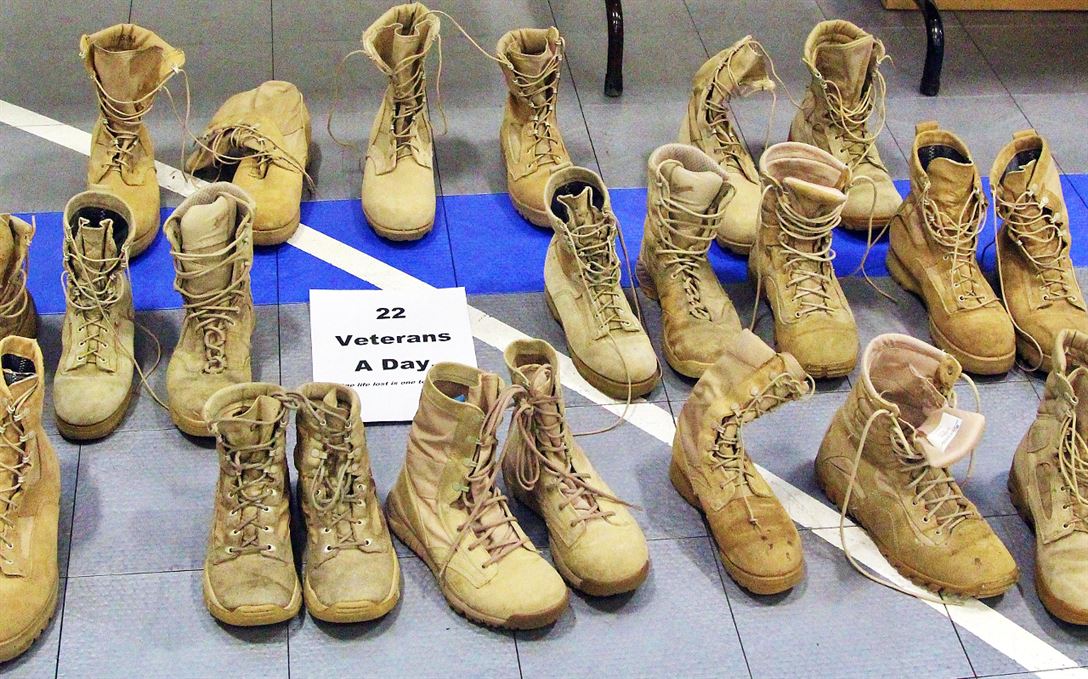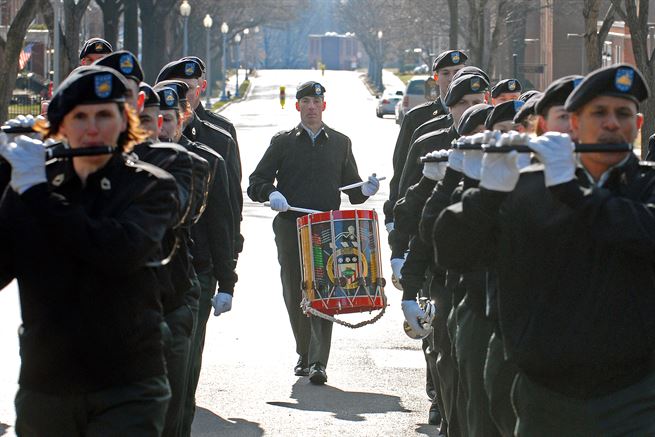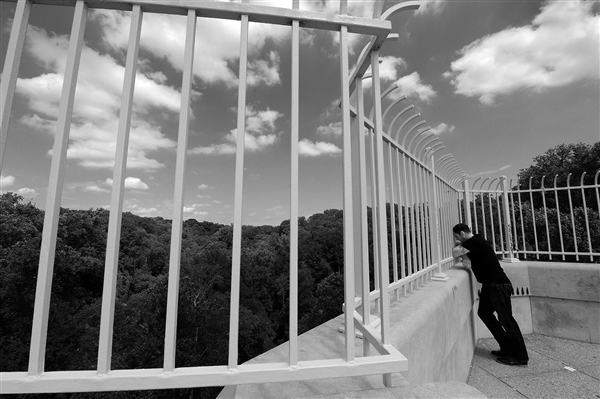
The Joint Services Support Directorate for the Washington National Guard displays 22 pairs of combat boots to symbolize the estimated 22 veterans a day who commit suicide. Sept. 26, 2014.
There they sit, the boots left behind. Never to be laced again, not by the one who wore them. They’re gone forever, but the reminders of them remain; the boots, to be sure, but the pictures, too. The memories. A small child in a fading photograph, grinning goofy smile. An awkward teen, nervously smiling in an pre-prom photo. A young service member, looking at the camera with a stoic, determined look; forever young. Forever gone.
You’ve heard it over and over again. A permanent solution to a temporary problem. A selfish act. A sin, even. All phrases to help someone to understand the impact of suicide. And some of the insidious problem is, in the midst of the pain and anguish that accompanies suicide, none of those matter. But perhaps this image of the objects left behind may make someone pause.
When I left home to join the Army, I left stuff behind at my parent’s houses. Some of the stuff they kept, some they didn’t. But what they kept, they kept for a really, really long time. The things we own, the things we have, remain here after we’re gone. My grandmother: an amazing artist. Painting, sculpture, dollmaking, you name it, she did it. Many in our family feel grateful that we have some of these things, gifts from the past that remain after she passed away over twenty-five years ago.
When people die, their possessions remain. These objects have no meaning except what we give to them; but the meaning we give to them is significant. Sometimes bitter, sometimes sweet, sometimes both.
My father passed away a year ago; my brother, sister, and I have his things. He didn’t commit suicide, but he’s still gone. I have his keys, hanging on a hook in my office. I don’t know what the keys go to. Whatever lock they fit will remain locked forever; or, if unlocked, will never be locked again. These are the everyday items that remain after someone leaves, and we hold them, or discard them. And the decision of what to do with them is not our problem when we are no longer here…that burden belongs to someone else.
This is not an attempt to guilt someone into not taking their own life. I recognize that those who are in a place where suicide is a very real possibility don’t need any more negativity; they feel bad enough already. Instead, this is meant to simply provide more facts to consider. More factors in the equation that I personally hope results in a veteran choosing live rather than death.
What We Leave Behind Carries the Weight of Our Life
Think of the objects that are meaningful to you. A piece of jewelry, perhaps, or a favorite book. The chair we sat in more than all the others, the things that you look at and think, “mine.” Then, think of the objects you own that are not meaningful to you; that half-used bar of soap. Those old shoelaces. Those boots that I mentioned at the beginning. All of these things remain after we leave, and must be kept or not kept. After my father passed away, the possessions that we decided to keep filled half of my garage for six months. They were constantly there, a reminder of his passing, until I got around to doing something about it.
What We Leave Behind is a Reminder of Our Death
In some cases, the objects that remain are treasured items that remind us of the loved and lost, and are cherished. My grandmother’s paintings. My father’s keys. These things we pick up as we travel through life and leave behind us can be appreciated as legacies. The things we leave behind after we cut our own lives short, however, bring a different reminder. A reminder of what might have been. For some, it is a reminder of what was or was not done. They are reminders of a question: did I do enough? Was there more that I could do?
What We Leave Behind is a Reminder of a Future That Will Never Be
If suicide is anything, it is an end of tomorrows. For someone in pain, that may be enticing, and entirely the point; but if there is an end of tomorrows, there is an end of everything that tomorrow brings. More pain, yes, because that is the human condition, but also the joys. Generations that come behind. Satisfaction of a life well lived. All of the interactions that are part of the human condition: graduations, and celebrations, and recognitions of effort.
In Ulysses, Alfred, Lord Tennyson, says: “Old age hath yet his honour and his toil.” There is respect for the old soldier, even if the old soldier feels alone and abandoned; and there is work to be done, either the daily work of family and friends, or monumental work that continues to impact the world. Let us reach those days, and not cut them short; let us continue to strive for both the honor and the toil
 The Head Space and Timing Blog is supported by the Colorado Veterans Health and Wellness Agency, a 501(c)3 Nonprofit in Colorado Springs, Colorado. The goal of the CVHWA is to provide military culturally competent mental health counseling to veterans and their spouses, regardless of characterization of discharge, time of service, or era of service. Our vision is to assist veterans to identify and remove barriers to their mental, physical, emotional, and behavioral wellness. For questions or inquiries, contact us!
The Head Space and Timing Blog is supported by the Colorado Veterans Health and Wellness Agency, a 501(c)3 Nonprofit in Colorado Springs, Colorado. The goal of the CVHWA is to provide military culturally competent mental health counseling to veterans and their spouses, regardless of characterization of discharge, time of service, or era of service. Our vision is to assist veterans to identify and remove barriers to their mental, physical, emotional, and behavioral wellness. For questions or inquiries, contact us!


